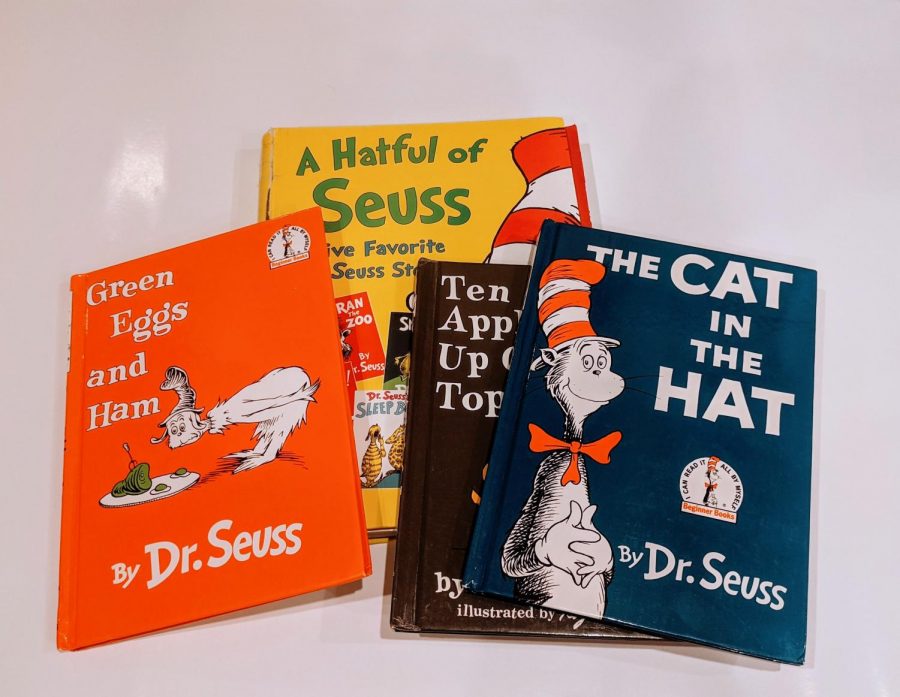Cancel culture must not destroy the Seussian soul of American childhood
Numerous Dr. Seuss classics have been pulled from stores and printers after concerns arose on Seuss’s 117th birthday.
March 10, 2021
In Dr. Seuss’s much-loved children’s book The Sneetches, a fantastical species of animals judge the worth of an individual simply on whether or not they have a star on their belly. The star-bellied Sneetches never let their plain-bellied counterparts join in on fun activities and look down on them in every possible way. At the end of the book, however, the Sneetches realize that outward appearances do not matter, and they abandon their ridiculous star-based hierarchy: “That day, all the Sneetches forgot about stars, / and whether they had one, or not, upon thars.”
Seuss was brilliant at encoding anti-prejudicial ideas in a way that was interesting for young children without sounding preachy or condescending, The Sneetches being an excellent example. Yet on his birthday, the internet decided to embark on a loony crusade against the esteemed author. Soon after, the Dr. Seuss Foundation announced that six of the legendary writer’s books would permanently be removed from print because they “portray people in ways that are harmful or wrong.”
The effect was immediate. Like in some twisted digital version of George Orwell’s 1984, within minutes of the announcement, the books, which had previously been selling for a few dollars on major online retailers, had vanished. Used copies were soon selling for hundreds of dollars; a “collectible” edition of And To Think That I Saw It On Mulberry Street, one of the banned books, was the only available edition and cost $10,000.
One would think that there would have to be seriously racist material for the removal to happen in such a fashion––perhaps there were slurs or ethnic violence. But on the contrary, most of the “racist” material could be more accurately called insensitive. In Mulberry Street, the cited reason for the removal was the mention of “a Chinese boy who eats with sticks”, along with a caricature-esque drawing of an Asian man holding a bowl of food and chopsticks.
Seuss intended to educate his audience on the cultures of the world through an international parade of people and animals, though, this stereotypical depiction was an unfortunate method of doing so. It may merit removal from the children’s section of certain libraries or the addition of an introduction or disclaimer that puts it in context. But to completely pull it off the market nation-wide so that no one can purchase it and no bookstores can sell it, is a measure as excessive as it is dystopian.
If there is a consensus that a book like Mulberry Street warrants removal from the American market, then by extension thousands of other books must go as well. Racial attitudes in the United States for the bulk of its existence were such that most mentions of other ethnicities in American literature would now be considered offensive. Classic books by Mark Twain and John Steinbeck should be swept off the digital bookshelves and tossed into the virtual bonfire with their Seussian companions.
The circumstances surrounding the Dr. Seuss book discontinuations are different from other recent “banned book” cases where censorship occurred at a local level. For instance, a school district might decide to remove The Handmaid’s Tale from its curriculum because of vulgarity and sexual content, or a conservative library might get rid of the Harry Potter books for their references to witchcraft, curses and magic. While these cases were always alarming, they were on a completely different scale from the nationwide disappearance of Seuss’s whimsical children’s books.
The test for whether a book should be kept or scrapped is simple: if it has nefarious intent or if the author was trying to advance racist or bigoted views, then it should be removed from reading lists and classroom libraries. However, it should not be permanently forced out of print so that it is inaccessible to scholars, specialists or the public. This explains why Adolf Hitler’s Mein Kampf Nazi manifesto is still widely kept in print.
But the idea that Dr. Seuss’s books were meant to be vehicles to advance racist ideas is laughable to anyone who has ever read them. Of course, there are insensitive and inappropriate aspects, but they reflect the widespread perceptions of the day. Children of the 21st century who read his tales may need context or edited versions that exclude the very few flagrantly racist parts, but the positive themes that remain in the timeless works can be a wonderful way to instill kindness and creativity in young readers.
Most of all, Seuss’s books are imaginative, funny and, with their brilliant rhyme schemes, delightful to read aloud. Morals about environmentalism, individuality and prejudice have crafted generations of mindful readers that aim to make a positive impact on the world. An America where books can be permanently pulled off the market at a moment’s notice because some people have decided they are racist is a far scarier place than one where children read and enjoy And To Think That I Saw It On Mulberry Street.




